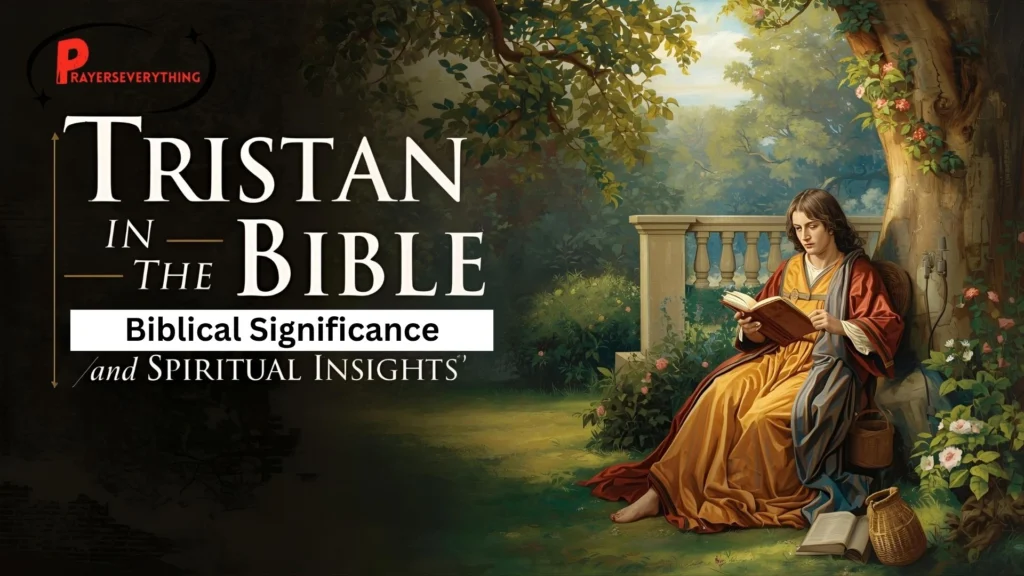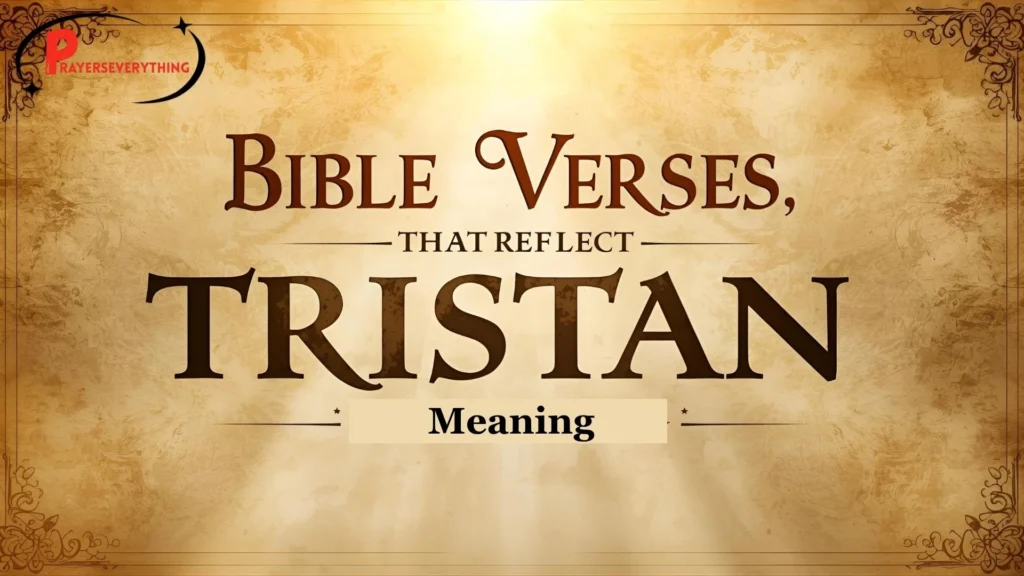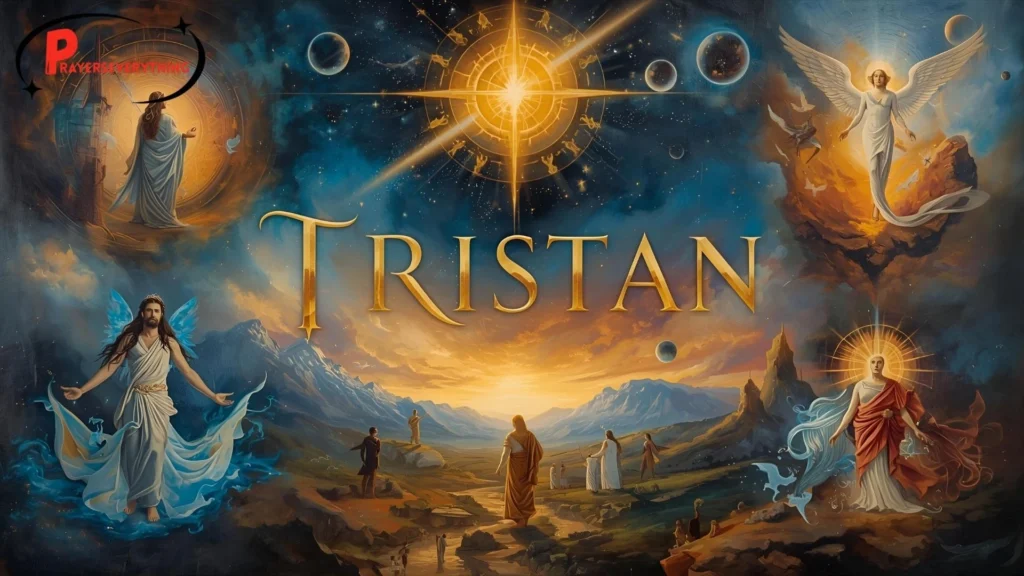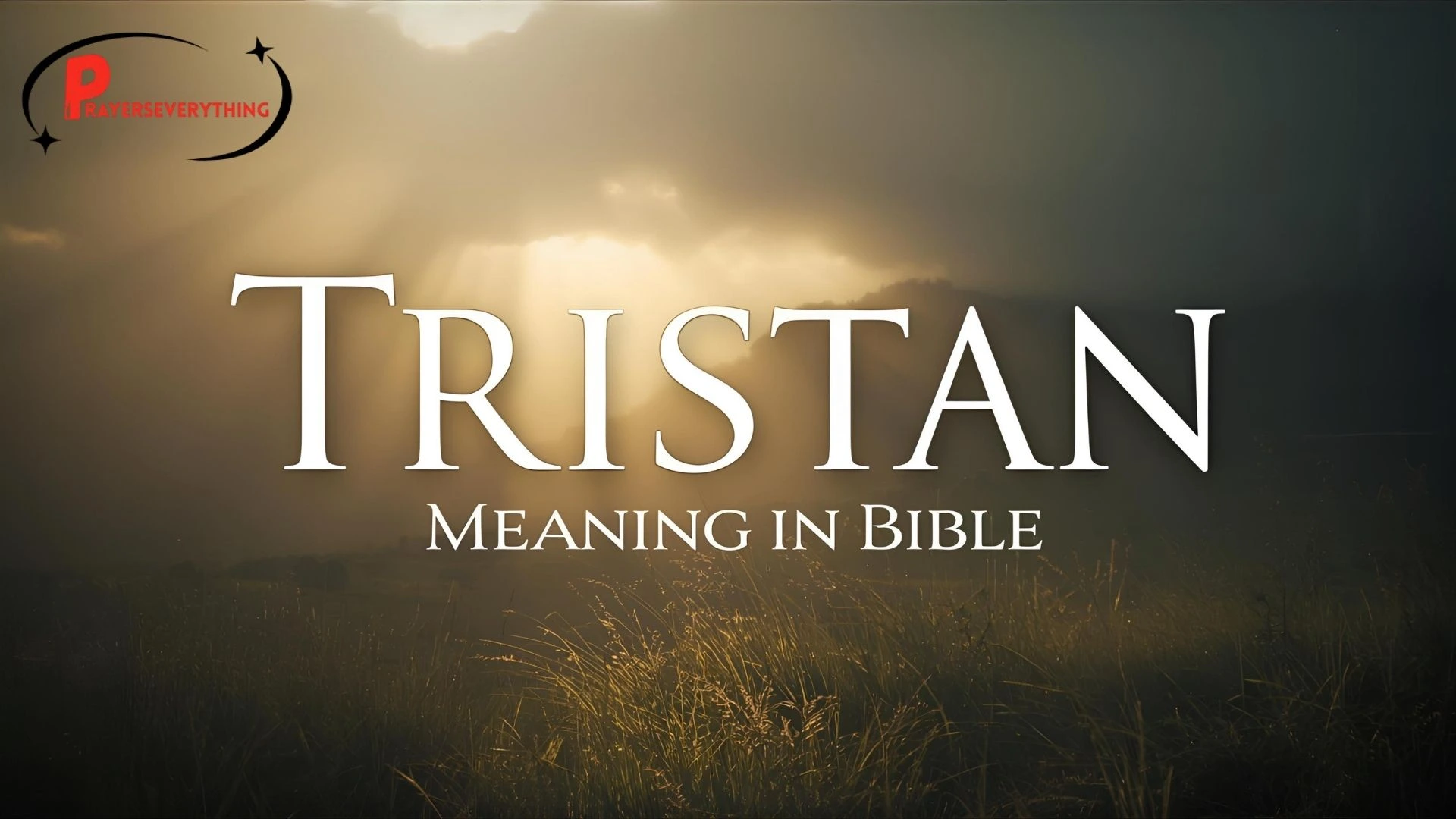The Tristan Meaning in Bible reflects both sorrow and strength. The name carries a sense of deep emotion and courage through faith. It connects with the heart of many Christian name meanings, showing how God turns pain into purpose. Even though it is not directly in Scripture, its message fits with biblical truth.
In the Bible, sorrow often leads to hope and renewal. The meaning of sadness in the Bible shows how faith grows through trials. The story of Job reminds us that even in loss, trust in God brings peace. These ideas give the name Tristan a strong spiritual foundation rooted in God’s promises.
The Tristan Meaning in Bible can also be seen through verses about strength and endurance. It reflects the sorrow to strength Bible verse found in the lives of believers. Like Job’s trials and faith, the name reminds us that every hardship can shape a stronger spirit. Tristan becomes a symbol of hope, courage, and lasting faith in God.
Is Tristan Mentioned in the Bible?
The name Tristan does not appear anywhere in Scripture. Biblical texts include names like David, Daniel, and Timothy. Tristan originates from medieval European literature and legend instead.
Though absent from the Bible, Tristan carries spiritual significance. The name’s meaning connects deeply with biblical themes today. Many Christian parents still choose Tristan for their children.
Tristan’s etymology reflects sorrow, boldness, and eventual transformation. These themes mirror numerous stories found throughout biblical narratives. The name resonates with journeys from suffering to strength.
Understanding Tristan requires exploring both Latin and Celtic roots. Each culture contributed unique meanings to this powerful name. Both interpretations align with Christian faith through trials today.
Tristan in the Bible: Biblical Significance and Spiritual Insights

Tristan is not a Christian name from biblical times. The name emerged centuries after Scripture was already written. Yet its meaning deeply reflects Christian name meanings today.
Spiritual symbolism of names matters greatly in faith communities. Tristan symbolizes strength after trials in Scripture’s broader themes. Many find hope after pain through this name’s message.
Biblical names and their meanings often guide parenting decisions. Though Tristan isn’t mentioned in the Bible, it works. The etymology of Christian names includes medieval options, too.
Is Tristan a Christian name in modern usage? Absolutely. Latin name meanings in Christianity extend beyond Scripture alone. Celtic names in Christian history also hold spiritual value.
| Aspect | Explanation |
| Biblical Presence | The Tristan name never appears in any Scripture text. The Bible was completed long before this name existed. |
| Christian Usage | Many Christians choose Tristan for sons despite his non-biblical origin. The Christian significance of Tristan lies in its deeper meaning. |
| Spiritual Themes | The name reflects sorrow to strength Bible verse messages. God restores brokenness through trials, just like Tristan implies. |
| Etymology | Tristan name history combines Latin and Celtic language roots. Both cultures shaped the meaning of Tristan origin we know. |
| Latin Root | “Tristis” means sorrowful, reflecting the meaning of sadness Bible. Latin interpretations emphasize grief transforming through faith and hope. |
| Celtic Root | “Drustan” or “Trystan” emphasizes boldness and tumult characteristics. Tristan boldness meaning connects to warrior-like spiritual courage. |
| Modern Relevance | Parents seeking names with depth choose Tristan frequently today. It bridges ancient etymology with contemporary Christian faith values. |
| Symbolic Value | Tristan represents the journey from pain to divine restoration. Spiritual encouragement in suffering defines this name’s core message. |
| Faith Connection | Though not biblical, Tristan aligns with Scripture’s redemption. Finding hope after pain mirrors Job’s trials and faith. |
| Cultural Heritage | Medieval literature popularized Tristan across European Christian societies. The name carries centuries of spiritual and cultural weight. |
Read More: 42+ Paramount Bible Verses About Hunting
Origin and Etymology of Tristan
The name Tristan carries profound historical and linguistic significance. The meaning of Tristan origin merges two distinct cultural traditions. Both Latin and Celtic roots contribute to its power.
Tristan name etymology, Latin Celtic origin, explained through language. The Latin connection emphasizes sorrow transforming into hope eventually. Celtic influence highlights boldness emerging from life’s tumultuous seasons.
Is the name Tristan mentioned in the Bible? No. However, its meaning reflects biblical principles about suffering beautifully. How Tristan symbolizes strength after trials in Scripture matters.
The meaning of Tristan in Greek versus Latin interpretations differs. Latin focuses on sadness, while Greek isn’t relevant here. Celtic traditions add warrior courage to the name’s identity.
Latin — Tristis (“sorrowful”)
- The Latin root “tristis” directly translates to sorrowful feelings.
- This reflects the meaning of sadness in the Bible context.
- Latin name meanings in Christianity often emphasize transformation journeys.
- Sorrow represents the starting point, not the final destination.
- Biblical narratives show how God restores brokenness after suffering.
- Job’s trials and faith exemplify Latin Tristan’s deeper meaning.
- David’s lament Psalms also connect to this sorrowful origin.
- Paul’s sufferings in Scripture demonstrate triumph over initial pain.
- The name suggests spiritual encouragement in suffering through Christ.
- Tristan becomes a reminder that sadness transforms into joy.
Celtic — Drustan / Trystan (boldness, tumult)
- Celtic roots, “Drustan” or “Trystan” emphasize a courageous warrior spirit.
- Tristan boldness reflects fighting through life’s challenging storms.
- Celtic names in Christian history celebrate strength during tumult.
- This interpretation adds dimension beyond simple sorrow and sadness.
- Boldness represents faith through trials that believers must demonstrate.
- Tumult symbolizes chaotic circumstances requiring divine intervention and guidance.
- The Christian faith context embraces both vulnerability and warrior courage.
- The Celtic meaning complements rather than contradicts Latin origins.
- Together, they create a holistic picture of a spiritual journey.
- Tristan becomes both mourner and warrior in Christian living.
The combination of Latin sorrow and Celtic boldness creates richness. What is the meaning of Tristan in Christian faith? It represents transformation through trials with courage and hope. This dual heritage makes Tristan powerfully meaningful for believers. Bible verses that reflect sorrow turning into hope validate. The name bridges ancient traditions with contemporary Christian identity.
Bible Verses That Reflect Tristan’s Meaning

Though the name Tristan isn’t found in Scripture directly. Biblical themes mirror its core meaning of transformation beautifully. Understanding these verses deepens appreciation for Tristan’s spiritual significance.
Sorrow to strength Bible verse passages illuminate this journey. The Bible repeatedly shows God working through human suffering. These connections make Tristan resonate with Christian name meanings.
Finding hope after pain defines the believer’s walk completely. Scripture provides countless examples of this redemptive pattern unfolding. Each verse below reflects Tristan’s journey from sadness onward.
Spiritual encouragement in suffering comes through God’s faithful promises. The following passages demonstrate how trials produce spiritual growth. They validate choosing Tristan as a name with purpose.
Romans 8:18 (NIV)
“I consider that our present sufferings are not worth comparing with the glory that will be revealed in us.”
Paul’s sufferings in Scripture demonstrate transformation through trials clearly. This verse encapsulates strong Bible verse themes. Present pain cannot compare with the future glory God promises.
The Apostle Paul endured tremendous hardship for Christ’s gospel. Yet he maintained perspective on temporary versus eternal realities. This mirrors how Tristan moves from sorrow to hope.
Romans 8:18 offers spiritual encouragement in suffering for believers. It validates the Latin “tristis” origin while pointing forward. Glory awaits those who endure faithfully through present trials.
This passage reflects the meaning of sadness in the Bible. Sorrow exists, but it doesn’t define our ultimate destiny forever. God restores brokenness through His redemptive plan and power.
James 1:12 (NIV)
“Blessed is the one who perseveres under trial because, having stood the test, that person will receive the crown of life that the Lord has promised to those who love him.”
Faith through trials produces spiritual maturity and eternal rewards. James emphasizes perseverance as key to receiving God’s promises. This embodies both Latin sorrow and Celtic boldness together.
Job’s trials and faith serve as a backdrop for James’ teaching. Enduring hardship with faith demonstrates genuine love for God. The crown of life awaits those who stand firm.
Tristan boldness meaning emerges clearly in this verse’s message. Perseverance requires courage to continue when circumstances look impossible. Celtic warrior spirit combined with patient endurance creates victory.
This verse validates the Christian significance of Tristan in modernity. Finding hope after pain becomes reality through steadfast faith. God rewards those who trust Him through every storm.
Job 1:21 (NIV)
“Naked I came from my mother’s womb, and naked I will depart. The Lord gave and the Lord has taken away; may the name of the Lord be praised.”
Job’s trials and faith represent the ultimate example of endurance. Despite losing everything, Job maintained worship and reverent trust. His story embodies Tristan’s journey from deepest sorrow onward.
The meaning of sadness in the Bible reaches depths. Yet Job refused to curse God despite unimaginable suffering. His response demonstrates how God restores brokenness over time.
This verse captures both acceptance and bold faith simultaneously. Job acknowledged God’s sovereignty over every life circumstance encountered. Such faith through trials inspires believers facing their struggles.
David’s lament Psalms echo similar themes of honest grief. Yet both men ultimately found hope after the pain passed. Job’s restoration story proves God’s faithfulness through darkest seasons.
Matthew 17:20 (NIV)
“He replied, ‘Because you have so little faith. Truly I tell you, if you have faith as small as a mustard seed, you can say to this mountain, “Move from here to there,” and it will move. Nothing will be impossible for you.'”
Jesus emphasizes faith’s power to overcome seemingly impossible obstacles. Even tiny faith can move mountains blocking our path. This reflects Tristan boldness meaning in the spiritual warfare context.
Celtic roots of Drustan celebrate courage in the face of tumultuous life. Christ’s teaching validates that bold faith produces miraculous results. Nothing remains impossible when we trust God completely today.
Spiritual encouragement in suffering comes from knowing faith works. Mountain-moving faith doesn’t require perfection, just genuine trust forward. This empowers believers facing their own overwhelming circumstances daily.
The verse connects directly to how Tristan symbolizes strength. From sorrow emerges boldness to believe God for miracles. Faith through trials transforms weakness into supernatural victory always.
Psalm 34:18 (NIV)
“The Lord is close to the brokenhearted and saves those who are crushed in spirit.”
David’s lament Psalms beautifully express God’s nearness during suffering. The brokenhearted find comfort knowing God draws especially close. This validates the Latin “tristis” meaning within the biblical framework.
The meaning of sadness in the Bible includes God’s compassion. He doesn’t abandon us in sorrow but approaches tenderly. God restores brokenness by His very presence with us.
This verse offers profound spiritual encouragement in suffering today. The crushed in spirit receive divine salvation and healing. Finding hope after pain begins with knowing God stays.
Biblical themes mirror Tristan’s core meaning of eventual transformation. Sorrow to strength, Bible verse passages like this inspire. God’s faithfulness turns mourning into joy through His love.
These five verses demonstrate Bible verses that reflect sorrow. Each passage shows a transformation from pain to hope clearly. Though Tristan isn’t mentioned in the Bible specifically today. Its meaning aligns perfectly with Scripture’s redemptive narrative throughout. Christian parents can confidently choose Tristan, knowing its significance.
Also Read: 50 Powerful Bible Verses About Discipline
Summary of this section
Biblical names and their meanings guide many parenting decisions. Tristan carries spiritual symbolism of names despite a non-biblical origin. The etymology of Christian names extends beyond Scripture alone. Latin and Celtic roots both contribute to Christian significance today. Is Tristan a Christian name worth choosing? Absolutely yes.
Spiritual Symbolism of the Name Tristan

Tristan carries deep spiritual meaning beyond simple etymology alone. The name embodies the transformational journey believers experience through life. Christian symbolism in the name Tristan reflects redemptive themes.
Each syllable whispers stories of sorrow turning into strength. The spiritual meaning of Tristan in Catholic tradition honors suffering. The name reminds us that God works through pain.
Sorrow → Strength
The Latin root “tristis” begins with sadness and grief initially. Sorrow and redemption Christian perspective, transform this starting point. The Bible shows how weakness becomes divine strength eventually.
Strength from adversity in the Bible appears throughout Scripture narratives. God specializes in turning mourning into dancing and joy. Tristan symbolizes this journey from brokenness to wholeness completely.
Trials → Trust
Difficult circumstances test every believer’s faith in God daily. Trust in God during trials defines authentic Christian living. Biblical themes of sorrow and joy intertwine through testing.
How Tristan symbolizes strength after trials in Scripture matters. Lessons from Job and David for someone named Tristan. Both heroes learned deeper trust through their painful experiences.
Pain → Purpose
Suffering never feels meaningless when God redeems it later. Jesus suffering and comfort demonstrate divine purpose in hardship. Moral lessons from hardship shape character and spiritual maturity.
Pain becomes the pathway to discovering God’s greater plans. Faith restoration stories fill Scripture from Genesis to Revelation. Tristan reminds us that purpose emerges from life’s pain.
Faith → Restoration
Believing in God through darkness leads to eventual restoration always. Psalm verses about brokenhearted promise God’s nearness and healing. Christian hope vs worldly sorrow offers eternal perspective today.
Faith activates God’s power to restore what was lost. The name Tristan celebrates this movement toward divine renewal. Restoration comes to those who trust God faithfully always.
Is It a Good Christian Name?
Yes, Tristan makes an excellent Christian baby name choice. Why choose Tristan as a Christian baby name meaning? It reflects the transformation journey every believer walks through life.
Is Tristan a Christian name suitable for modern families? The spiritual significance outweighs its non-biblical origin completely today. Christian significance of Tristan lies in its deeper message.
- The name teaches children about God’s redemptive work daily
- It connects Latin and Celtic heritage with faith beautifully
- Tristan reminds us that sorrow doesn’t define our destiny
- The name celebrates the boldness required to follow Christ faithfully
- Parents can explain biblical themes through Tristan’s very meaning
Meaning of names derived from Latin carries historical weight. Tristan name history spans centuries of European Christian culture.
The name fits perfectly within contemporary Christian naming traditions. Spiritual encouragement in suffering defines Tristan’s core message today.
Tristan in Legends vs Christian Truth
Medieval legends tell romantic tales about Tristan and Isolde. The legendary Tristan pursued forbidden love, which ultimately led to great tragedy. These stories ultimately emphasize human passion over divine purpose.
The meaning of the origin includes both legend and faith. Christian parents must understand the distinction between fiction and truth. The name transcends its literary origins through biblical application.
In the Legend:
- Tristan represents tragic romance and forbidden earthly love relationships
- The story ends in death without redemption or hope
- Human desire drives the narrative toward inevitable destructive consequences
- Sorrow results from the sinful choices made by both characters
- The legend offers no eternal perspective or spiritual lessons
But in Christian Truth:
- Tristan symbolizes transformation through God’s redemptive grace and power
- Sorrow becomes a pathway to strength through faith in Christ
- Biblical themes of sorrow and joy replace tragedy with hope
- God restores brokenness instead of leaving us in despair
- The name points toward an eternal purpose beyond temporary pain
The legend doesn’t define Tristan’s Christian meaning at all. Is the name Tristan mentioned in the Bible? No absolutely. Yet its themes align with Scripture’s redemptive narrative beautifully.
The meaning of Tristan in Greek versus Latin interpretations matters. Christian families reclaim Tristan for God’s purposes and glory. Tristan boldness meaning emerges through faith rather than romance.
Conclusion
The Tristan Meaning in Bible reflects sorrow, strength, and faith. It connects deeply with Christian name meanings that show God’s purpose in every season. Even though the name is not written in Scripture, its message speaks of courage and hope. It reminds us that God can turn pain into peace and sorrow into strength.
The Tristan Meaning in Bible also relates to many Biblical names and their meanings that reveal lessons of endurance. The meaning of sadness in the Bible teaches that trials can bring us closer to God. Through faith, every struggle becomes a step toward healing. Tristan carries this same message of trust and renewal.
Frequently Asked Questions
What is the meaning of Tristan in the Bible?
Tristan means sorrowful yet symbolizes strength and hope through faith.
What is the meaning of Tristan?
Tristan comes from Latin and means sad or full of sorrow.
Is the name Tristan good?
Yes, it is a meaningful and positive name that reflects courage and faith.
Does Tristan mean brave?
Yes, in some origins, it also carries the meaning of bold or courageous.
What is the Tristan meaning in Bible verse context?
It represents enduring trials with faith and finding purpose in pain.
What is the Tristan meaning in Greek?
It does not have a direct Greek origin or meaning.
What is the Tristan meaning in Hebrew?
It is not a Hebrew name and has no biblical Hebrew root.
What does the name Tristan say about personality?
It reflects a strong, faithful, and resilient personality.
How is Tristan pronounced in the Bible context?
It is pronounced as Tris-tan.
What is the Tristan meaning in Bible Catholic interpretation?
It symbolizes finding strength and peace through trials, guided by God’s grace.
What is the Tristan meaning in Hindi?
It has no traditional Hindi meaning but may be linked to emotions or courage.
Is the name Tristan in the Bible?
No, the name Tristan is not directly mentioned in the Bible.

Noah shares heartfelt insights on Prayer, Bible teachings, and spiritual blessings, guiding readers with meaningful words and synonyms that inspire faith, hope, and a deeper connection to God’s presence.

